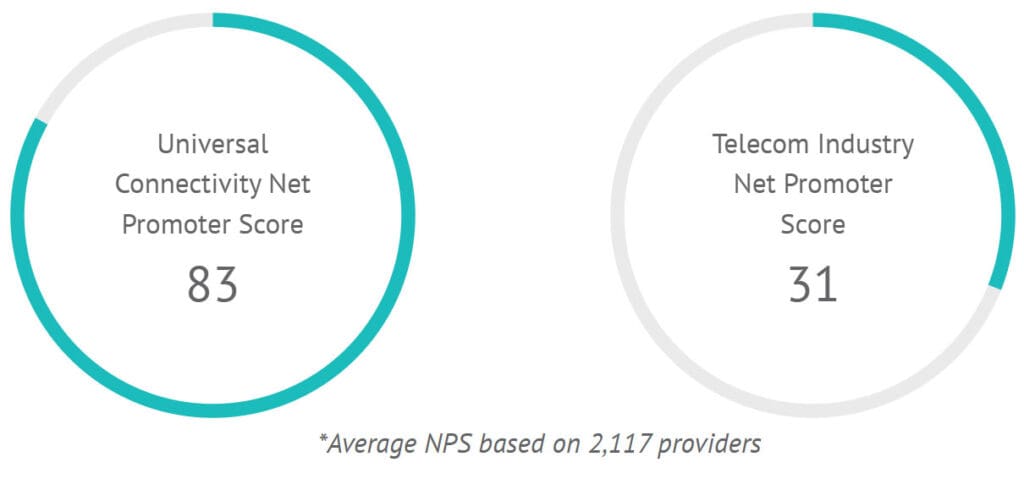Your Business’s Net Promoter Score and Why It Is Important

As a business leader, you’re always looking for ways to improve customer satisfaction and loyalty. One metric that can help you measure these factors is the Net Promoter Score (NPS). This metric is based on the idea that customers fall into three categories: promoters, distractors, and passive customers. The promoters are those highly satisfied with your business and are likely to recommend it to others. Detractors are those who are unhappy with your business and are likely to discourage others from using it. Passive customers fall somewhere in the middle – they’re satisfied, but not enthusiastic.
The “Aha moment” for leaders with NPS often comes when they see how the score correlates with business outcomes such as customer retention, revenue growth, and market share. When leaders realize that a high NPS score is associated with positive business outcomes, they are more likely to invest in initiatives aimed at improving the customer experience and increasing customer loyalty.
NPS 101
The feedback received from NPS surveys can help identify specific areas of the business that need improvement. This can help address customer pain points and improve overall customer satisfaction. The NPS score range is from -100 to +100 and is calculated based on the responses to the NPS question on a how likely they are to recommend the product or services to others (on a scale of 0-10). Those who score 9 or 10 are considered promoters, those who score 0-6 are considered detractors, and those who score 7 or 8 are passive. Once you have the scores, you calculate your NPS by subtracting the percentage of detractors from the percentage of promoters.
The benchmark for a good NPS score varies by industry and can depend on factors such as customer expectations and the competition. However, in general, an NPS score of 50 or above is considered excellent, while a score of 30-40 is considered good. A score below 0 is considered poor and may indicate there are serious issues with the business that need to be addressed. In this blog post, we’ll discuss why it’s important for your business, who pays attention to the NPS score and how you can improve it.
Why Just One Question?
NPS is based on only one question because it is designed to be a simple and straightforward way to measure customer loyalty and likelihood to recommend. The question typically asked is, “On a scale of 0 to 10, how likely are you to recommend our product/service to a friend or colleague?” The simplicity of the NPS question allows for easy implementation and quick feedback from customers. It also avoids overwhelming customers with a long survey, which can lead to survey fatigue and lower response rates.
The NPS question is also effective because it focuses on the most important aspect of customer loyalty: word-of-mouth recommendations. Customers who are willing to recommend your product or service to others are likely to be loyal customers who will continue to do business with you in the future.
Why NPS is Important to a Business
It is important because it helps leaders discover the strength of their brand and customer experience quality. The NPS score can be used by businesses of all sizes and across all industries. It is particularly popular among business in the service industry, such as hospitality, healthcare, and financial services where customer satisfaction is critical to business success. However, businesses in other industries, such as e-commerce, retail and technology also use NPS as part of their customer feedback and satisfaction measurement programs. By regularly tracking your NPS, you can gain valuable insights into your customers’ experiences and use this information to make informed decisions about how to improve your business. NPS is important to a business for several reasons:
- Simple to implement: NPS is a simple and easy-to-understand metric that can be implemented quickly. This makes it easy to incorporate into your customer feedback process.
- It’s time efficient: NPS surveys provide quick feedback with a high response rate from customers allowing your business to identify and address issues in a timely manner.
- Benchmark against competitors: NPS is widely used which allows your business to benchmark against industry standards and competitors and understand how your business compares in terms of loyalty and satisfaction.
- It’s actionable: Categorize the feedback given – both positive and negative to discover the strengths and weaknesses of your product and services.
- It’s a management tool: Share results with your team so they can learn and take action. This will help them to better understand customer needs and provide more effective support.
- Helps drive business growth: a high NPS score can help drive business growth by increasing loyalty, attracting new customers through word-of-mouth recommendations, and improving customer retention rates.

Who Pays Attention to the NPS Score?
Various stakeholders pay attention to the Net Promoter Score (NPS) of a business, including:
- Business owners, CEOs, and management teams gain an understanding of how well their business is performing in terms of customer service and loyalty. This allows them to make informed decisions and work on the business to implement practices that prioritize customer-centric initiatives and invest resources to improve the customer experience.
- Customer service teams are able to identify customer pain points and identify areas where customers are most dissatisfied. This information will help prioritize and focus efforts to address additional training needed and where new processes or technology could be implemented. They will also be able to identify customers who are highly satisfied. These customer can be leveraged as advocates for the business, through referrals, positive reviews and testimonials.
- Marketing teams can identify customers who are likely to recommend the business to others and develop targeted marketing campaigns to attract new customers. A high NPS score can also be used in marketing and advertising materials to promote a business’s reputation for customer satisfaction.
- Sales teams can identify potential customers, establish credibility and trust, drive customer referrals, and address concerns. If your business has a high NPS score, highlight the competitive advantage to differentiate your business from competitors to position your products and services as the better choice.
- Investors use it as an indicator of long-term growth potential and sustainability. A high NPS score may signal that a business has a loyal customer base and a strong brand reputation, which can increase investor confidence. On the other hand, a low NPS score may indicate that the company is at risk of losing customers and may need to take steps to improve it’s customer experience. It’s one factor among many when evaluating the potential investment opportunities of a company.
Improving Your NPS Score
Improving NPS is a continuous process, and it takes time and effort to build customer loyalty and satisfaction. It is important to focus on addressing the root causes of customer dissatisfaction. By doing this, you can improve the customer experience and drive a higher NPS score over time. Here are a few steps you can take to do this:
- Analyze customer feedback: Start by analyzing the feedback including the NPS survey responses, reviews, and customer service interactions to identify common themes or issues that are causing customer dissatisfaction. Once you’ve identified the most common issues, prioritize them based on their impact on the customer experience and the business. Assigning each negative response to the correct stage of the customer journey will quickly allow you to discover the weakest points and be able to address them.
- Develop an action plan: To truly drive growth for your company, simply monitoring your NPS score is not sufficient. It is crucial to act on your findings by sharing them with your team and addressing the most pressing issues. By implementing changes identified in your action plan and communicating them to your customer, you demonstrate a genuine commitment to taking their feedback seriously.
- Respond to your detractors: Respond promptly to negative feedback from distractors by contacting the customer directly. Addressing concerns, actively listening, and learning from their experience will help work towards a resolution and improve your overall customer experience. Take time to gather more detailed information about the customer’s journey to gain valuable insights.
- Leverage your promoters: This group has explicitly told you that they are very likely to recommend your company – so make it happen. Ask them to leave a review or testimonial. Depending on the type of business, do a case study on the project your company fulfilled and the value it brought to the customer.
Conclusion
Overall, Net Promoter Score is an important metric for any business that wants to improve customer satisfaction, identify areas for improvement, attract new customers, and retain existing ones.. At Universal Connectivity, we implement the Net Promoter Score (NPS) survey after every customer interaction or job fulfillment. This allows us to create a plan, execute it and follow up with our customers. We are committed to providing an exceptional customer experience and are proud to have an NPS score of 83 in an industry where the average is 31. By regularly tracking your NPS, you can gain valuable insights into your customer’s experiences and use this information to make informed decisions about how to improve your business.
Choosing a Business Phone Provider
How do you choose the right business communication partner to help your business thrive? Grab our free, one page checklist. Compiled based on years of experience, this download can help you jump start your search and selection process and:










